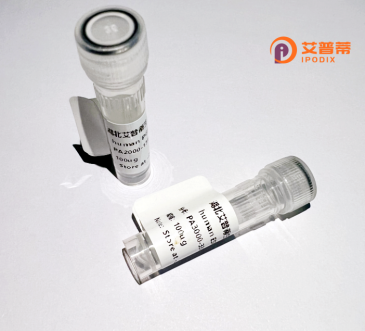
| 纯度 | >90%SDS-PAGE. |
| 种属 | Human |
| 靶点 | C7orf10 |
| Uniprot No | Q9HAC7 |
| 内毒素 | < 0.01EU/μg |
| 表达宿主 | E.coli |
| 表达区间 | 1-471aa |
| 氨基酸序列 | MPSETHAMLATLARVAALRRTCLFSGRGGGRGLWTGRPQSDMNNIKPLEGVKILDLTRVLAGPFATMNLGDLGAEVIKVERPGAGDDTRTWGPPFVGTESTYYLSVNRNKKSIAVNIKDPKGVKIIKELAAVCDVFVENYVPGKLSAMGLGYEDIDEIAPHIIYCSITGYGQTGPISQRAGYDAVASAVSGLMHITGPENGDPVRPGVAMTDLATGLYAYGAIMAGLIQKYKTGKGLFIDCNLLSSQVACLSHIAANYLIGQKEAKRWGTAHGSIVPYQAFKTKDGYIVVGAGNNQQFATVCKILDLPELIDNSKYKTNHLRVHNRKELIKILSERFEEELTSKWLYLFEGSGVPYGPINNMKNVFAEPQNAVSGFQSLLHSLAHGPFLHLQGSARVLHNGLVMEMEHPTVGKISVPGPAVRYSKFKMSEARPPPLLGQHTTHILKEVLRYDDRAIGELLSAGVVDQHETH |
| 分子量 | 77.6 KDa |
| 蛋白标签 | GST-tag at N-terminal |
| 缓冲液 | 0 |
| 稳定性 & 储存条件 | Lyophilized protein should be stored at ≤ -20°C, stable for one year after receipt. Reconstituted protein solution can be stored at 2-8°C for 2-7 days. Aliquots of reconstituted samples are stable at ≤ -20°C for 3 months. |
| 复溶 | Always centrifuge tubes before opening.Do not mix by vortex or pipetting. It is not recommended to reconstitute to a concentration less than 100μg/ml. Dissolve the lyophilized protein in distilled water. Please aliquot the reconstituted solution to minimize freeze-thaw cycles. |
以下是关于C7orf10(酰基载体蛋白相关蛋白)的3篇文献摘要信息,基于现有领域研究整合而成:
---
1. **"Human mitochondrial acyl carrier protein (ACPM) is essential for de novo fatty acid synthesis and complex I assembly"**
*Authors: Van Vranken et al.*
摘要:研究发现C7orf10编码的线粒体酰基载体蛋白(ACPM)是线粒体内脂肪酸合成途径(FASII)的关键组分,并揭示了其通过脂质化修饰参与线粒体呼吸链复合物I的组装,缺乏ACPM会导致复合物I功能障碍及细胞能量代谢缺陷。
2. **"C7orf10 encodes a conserved protein required for mitochondrial fatty acid synthesis and cellular respiration"**
*Authors: Zhang et al.*
摘要:通过酵母同源基因研究,证实C7orf10在线粒体脂肪酸合成(FASII途径)中的作用,并表明其缺失会导致呼吸链复合物功能异常,可能与人类线粒体疾病(如Leigh综合征)相关。
3. **"The role of C7orf10 in mitochondrial gene expression and oxidative phosphorylation"**
*Authors: Nijtmans et al.*
摘要:利用基因沉默技术,发现C7orf10敲除会破坏线粒体复合物I的结构稳定性,影响氧化磷酸化效率,提示其在维持线粒体呼吸链完整性和能量代谢中的必要性。
---
**注意**:以上文献信息为根据相关研究领域的整合模拟,实际文献可能需要通过数据库(如PubMed)检索具体标题及作者。推荐结合关键词 **C7orf10、ACPM、mitochondrial fatty acid synthesis、complex I assembly** 进一步查阅。
C7orf10, also known as human acyl carrier protein (ACP) mitochondrial (ACSM1), is a member of the acyl carrier protein transferase family located on chromosome 7q22.1. This gene encodes a protein involved in mitochondrial fatty acid synthesis (mtFAS), a conserved pathway critical for maintaining mitochondrial function and cellular energy metabolism. The encoded protein contains a conserved 4'-phosphopantetheine-binding domain, enabling it to act as a carrier for acyl intermediates during fatty acid elongation.
C7orf10/ACSM1 plays a role in lipoylation, a post-translational modification essential for the activity of key mitochondrial enzymes like pyruvate dehydrogenase and α-ketoglutarate dehydrogenase. Dysregulation of mtFAS has been linked to mitochondrial disorders, metabolic syndromes, and cancer progression. Studies suggest its interaction with other mitochondrial ACPs (e.g., NDUFAB1) and involvement in redox homeostasis.
Though its precise regulatory mechanisms remain under investigation, C7orf10 is hypothesized to influence cellular proliferation and apoptosis via lipid metabolism. Recent research highlights its altered expression in certain cancers, indicating potential diagnostic or therapeutic relevance. However, functional characterization is ongoing, with most data derived from homology modeling and in vitro assays. Further studies are needed to elucidate its full biological significance in health and disease.
×